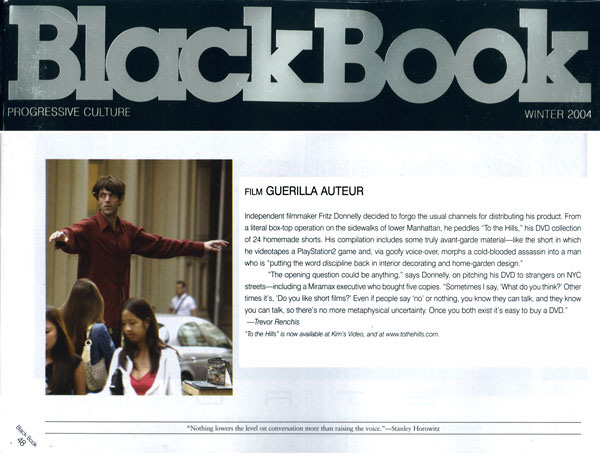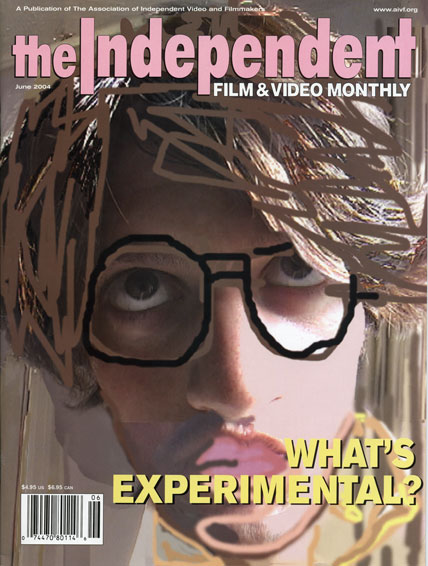 |
feature in Black Book Magazine
by Editor cover story in The Independent by Fritz press in Chinese and more
|  |
 | |||||||
| ** | see INSIDE - scanned jpg of the article | ||||||
| film GUERILLA AUTEUR Independent filmmaker Fritz Donnelly decided to forgo the usual channels for distributing his product From a literal box-top operation on the sidewalks of lower Manhattan, he peddles, "To the Hills," his DVD collection of 24 homemade shorts. His compilation includes some truly avant-garde material-like the short in which he videotapes a PlayStation2 game and, via goofy voice-over, morphs a cold-blooded assassin into a man who is "putting the word discipline back in interior decorating ad home-garden design." "The opening question could be anything," says Donnelly on pitching his DVD to strangers on NYC streets-including a Miramax executive who bought five copies. "Sometimes I say, 'What do you think?' Other times it's, 'Do you like short films?' Even if people say 'no' or 'nothing,' you know they can talk, and they know you can talk, so there's no more metaphysical uncertainty. Once you both exist it's easy to buy a DVD." --Trevor
Renchis "To the Hills" is now available at Kim's Video, and at www.tothehills.com | |||||||
cover story in The Independent
 |
| ||||||||||||||||||||||||||||||||||||||||||
| ** | see INSIDE - scanned jpg of the article | ||||||||||||||||||||||||||||||||||||||||||
| Cool
School for Indies You want more people to see your film. You think: I need a better script and more believable characters. You're wrong. Keep your shaggy script and those doggerel characters the way they are. What you need is to be a better person, a cooler person, more yourself, and more exaggerated. Once you read about this collection of degenerates, you'll see that you too can appeal to millions under the right lighting. First, before we go on, you should decide whether you are making movies for one or all of the following reasons:
You can't make movies that make money unless you already have money, so throw out "d." Otherwise, use this article to get the most fame in the best world while having the most fun.
I have just signed my first distribution deal,
at gunpoint, and believe that it will make me the wealthiest, wisest, independent
filmmaker in history. Or at least that's what I tell myself now. This was the
argument that warmed me up to this pact of blood: "If you were in he manufacturing
business and you built a new factory for each new style of shoe, people would
think you were crazy. If you also changed the name of your brand after every production
cycle, your marketing team would walk out. And yet this is how independent filmmakers
operate. I'm offering you the chance to consolidate your manufacturing process,
your marketing effort, and your distribution outlets without losing any creative
control." And everything Omar said is true. Rather than promote the movies, Omar told me, "We promote each other." Actually he said, "You promote me."
I had been waiting for three hours on the hot Arizona pavement. At first I thought no one was picking me up because I hadn't shaved or cut my hair. Omar picked me up but because he was running out of gas, he was afraid to turn of the engine. So I jumped in the back while the automobile was still moving. I jumped with my bag inn had because I could tell that if I threw the bag in first he would speed away without me. The first instinct you have about a person is usually the right one-I wish I had sacrifice my bag so that today I might still have my soul. I stared at the back of Omar's head, obscured mostly by the turban he wore, and listened to his girlfriend and their three children sing. Around me were shifted stacks of chairs and an enormous projector. I was only the latest addition to Omar's movie limousine. Omar
Shabat and his partner Disraeli Sadat rove the American West and Southwest
in their limousine setting up chairs and projecting their movies to small audiences.
They charge $3-$5 admission and sell beer at a 100 percent mark up. Usually about
fifty people show and afterwards Omar and Disraeli rap. The primary influence
on their filmmaking is Battle for Algiers-"stupid movie," chimes Disraeli.
Their musical influence? "Double double, trouble, trouble!" (Double
Trouble was a rap duo in the early eighties.) Omar is many things--a singer, "electro-dancer," a sniper's cousin--but foremost he is a filmmaker. When I first met Omar, he showed me the gun that has become his trademark and logo for his film company. He has been shot nine times. Twice y Elyse, his current girlfriend. "You got too many kids to be a director," Omar shouted at Elyse, a magnanimous woman and the visionary behind all his films. "I'm the director," he says. In point of fact, Elyse directed their last film; Omar and Disrraeli were co-producers. It's because of Elyse that I'm looking forward to my collaboration with them. We're producing a DVD of short "foreign-language" action film. Omar uses a gun the way the surrealists intended. Not s a means of self-defense but as a way of throwing a crowd into a state of panic and rupturing their sense of reality. His film persona and cinematography style reflect this surrealist bent. "No bullets, only guns," he says of his films. He is perhaps more interesting than his movies, or maybe his movies are better after having met or heard about him. At first I didn't understand why he took the driver's seat while Elyse and Disraeli, by far the more talented, lurked in the background. "He's my Queen of England," explains Elyse. "I don't want to give interviews. Omar loves to talk, and he loves to dance. He's the perfect representative for our vision," she says. "He has an answer for everything, but because of his attention span he can't ruin the suspense by telling you the whole story." Disraeli feels differently. "Omar is no good," he tells me. "He wants aggrandizement." When Omar and Disraeli shoot a movie, each wields a camera, and both call "action" and "cut," even though the actors don't move until Elyse gives a hand signal. For all his faults, Omar is an outstanding cinematographer-a kind of idiot savantfor whom a camera penetrates this thick crust of inanity. I saw the transformation occur on the scene of Must, Omar's unfinished remake of Finnish filmmaker S. Pael's final masterpiece. The main character in Omar's version is played by SURF, the last member of our newly formed cartel. I have never been able to reconcile SURF's deliberate, calculated acting style with the rest of his personality.
"You don't need to know me. The lesser the better," says SURF, who is full of this kind of jargon, a way of talking that I originally proscribed to California. I've just received the contract back from Omar and SURF. Though he claims to have never learned how to read, SURF has crossed out the word "net" and replaced it with "gross" in the profit sharing section. In the folder with this updated contract are the photos of our group. These are a crucial element to our coordinated branding effort. I'm required by contract to print SURF's name in capital letters, and to choose from the following adjectives when describing images of him: "endearing," "boastful," or "toned." Believe it or not, SURF's boastful smile is his least contribution to our cartel, his business acumen is highly honed-or toned. Thanks to him we have a website: www.filmcartel.comm. SURF also uses a number of calculations to determine how to spend his time, which usually yield "sit around" or "go to the beach." Omar, SURF, and myself have banded together to form a distribution company. Each of us has a different approach to getting our films seen. I distribute by hand and on TV; Omar believes in theatrics and the cinema; and SURF's films are free on the Internet. Rather than a company, what we have is an institutionalized argument. Our sole point of agreement is the inspiration for this article, and may be of use to you in your work: It is easier to promote one another than it is to promote our movies-none of which any of us like or have time to watch. The key is to first think
about your filmmaker persona. Some of the tips and exercises to the right
will help. In the meantime, start by taking something you don't like in someone
else and apply it to yourself; once you've achieved detachment you can objectively
add any other traits you want. Try it for a year. Take some pictures. And when
you're bored with that, shoot your movie. You're the star. Who's the star? Say
"I'm the star." - Feb. 2004 (published June 2004, The Independent Film and Video Monthly) Fritz Donnelly is a New York based Filmmaker, currently working on a how-to action feature. His other films can be viewed at www.tothehills.com.
| |||||||||||||||||||||||||||||||||||||||||||
 | |||||||||||||||||||||||||||
| ** | see INSIDE - scanned jpg of the article | ||||||||||||||||||||||||||
| |||||||||||||||||||||||||||




